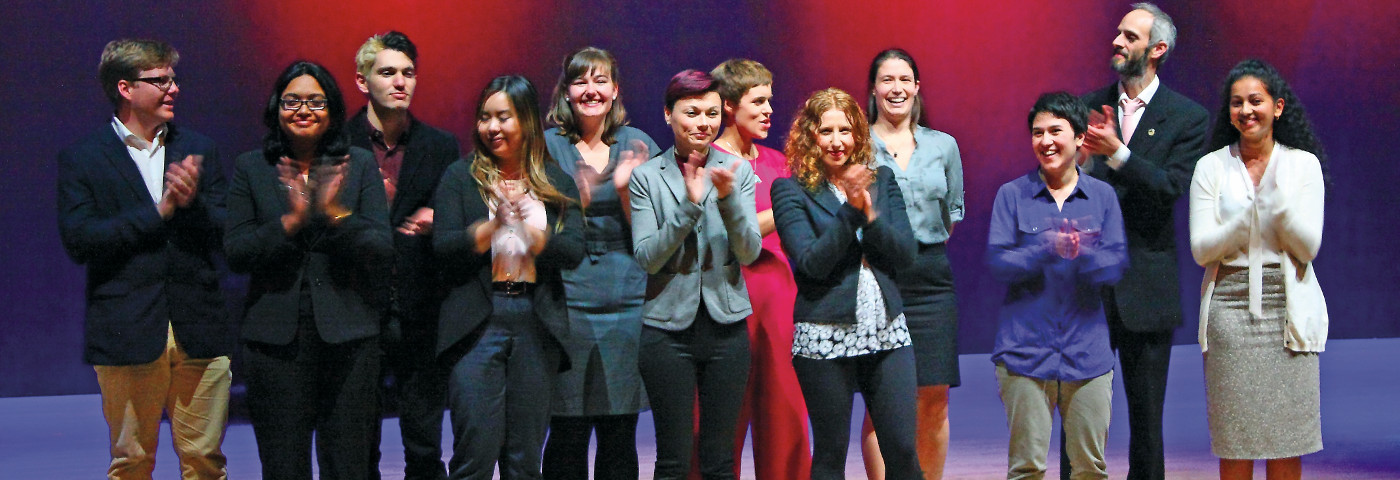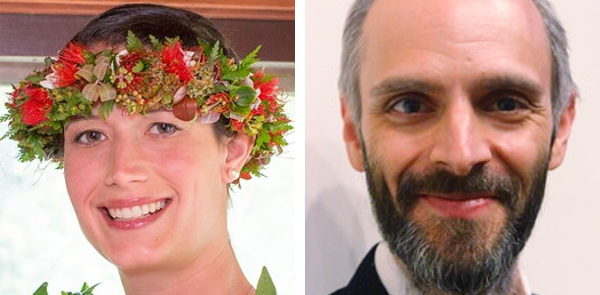
A three-minute challenge
Competition showcases graduate student research
As a graduate student, you spend years on your thesis or dissertation, mastering every detail of your experiments, calculations, interpretations, and analysis. Now try distilling all that expertise into a talk just three minutes long. And do it in an engaging and entertaining way with no jargon, so any intelligent person can understand it.
This year, more than two dozen UC Santa Cruz graduate students took on that challenge, competing against one another as part of the fourth annual UCSC Grad Slam. “Experiencing the diversity of the work our grad students are doing in all kinds of areas and in all disciplines—that’s very exciting,” said Vice Provost and Dean of Graduate Studies Tyrus Miller, who emceed the final round of competition, held at the Music Center Recital Hall in late February.
A systemwide, UC-only, annual contest with its own rules, Grad Slam is similar to the popular Three Minute Thesis (3MT®) competition that originated at the University of Queensland in Australia. Each UC campus holds its own competition to choose one champion to compete in the final systemwide event (runner-ups are also invited to attend). For the first round of the UCSC competition, students submitted videos of their three-minute talks—some honed with the help of a series of workshops on presentation skills. Twelve finalists—chosen by a group of UCSC administrator and staff screening judges—presented live onstage in front of an audience and a final judging panel that included Santa Cruz mayor David Terrazas, city council members, and other community leaders.

For the first time, all five academic divisions were represented in the competition. Finalists included Tony Assi, an M.F.A. student in digital arts and new media, who uses eye-tracking technology to understand perception of visual art, such as Leonardo da Vinci’s The Last Supper. Eilin Francis, a Ph.D. student in economics, has found that scheduled payment plans can help people in the developing world—who often don’t have bank accounts—save money. Sharmistha Guha, a Ph.D. student in statistics and applied mathematics, uses statistics to analyze brain networks, hoping to unlock the secrets of creativity. And Tiffany Thang, an M.S. student in computational media, is developing virtual-reality games to help people with developmental disabilities learn to recognize emotions.
Taking home the runner-up prize (and $1,500) was Nickolas Knightly, a Ph.D. student in philosophy. He’s tackling one of the deepest questions around: how we know what we know. Events like the Grad Slam underscore the importance of being able to clearly communicate your research, he said. “If people can’t understand what we are working on, they cannot possibly open up to what it might mean and how it might help us all to grow.”
In the end, Ph.D. student Kimberley Kanani Bitterwolf emerged victorious as both the UCSC Grad Slam champion and the people’s choice (audience vote) winner, receiving $3,000 and $750 for each prize, respectively. Glory by association goes to her fellow finalist and husband, Stephan Bitterwolf, a Ph.D. student whose research aims to identify molecular signatures of environmental stress on coral reefs. Her own research analyzes the geochemistry of river systems to calibrate measurements of ancient climate. “I didn’t think that paleoclimate was something that people would get excited about,” she said. “I’m really surprised and happy.” In May, Bitterwolf represented UCSC at the UC-systemwide Grad Slam at the offices of LinkedIn in San Francisco, where she competed against the champions from the other UC campuses. To learn the final results and watch the presentations, point your browser to gradslam.universityofcalifornia.edu.

